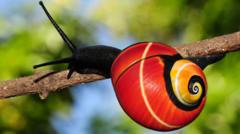In a significant operation, Nigeria's customs agency has intercepted over 1,600 illegally trafficked birds, highlighting the continuous struggle against wildlife crime in the region.
**Nigeria's Largest Wildlife Trafficking Bust Seizes 1,600 Birds Bound for Kuwait**

**Nigeria's Largest Wildlife Trafficking Bust Seizes 1,600 Birds Bound for Kuwait**
Nigeria Customs Service announces record seizure of birds amid ongoing wildlife trafficking challenges.
Nigeria's Customs Service (NCS) has achieved a landmark seizure, intercepting over 1,600 birds intended for Kuwait at Lagos International Airport, marking it as the country's largest wildlife-trafficking bust to date. This operation occurred on July 31, but details were only released publicly recently to avoid compromising the ongoing investigation, according to NCS spokesperson Abdullahi Maiwada.
The intercepted shipment consisted primarily of ring-necked parrots and green- and yellow-fronted canaries, all of which were being transported without the necessary permits and documentation. Although these species are relatively common, the absence of legal papers highlights the issues of wildlife trafficking in Nigeria, which continues to thrive due to widespread corruption, lax enforcement, and the country’s porous borders.
Investigative efforts are now underway to identify and hold accountable those responsible for the illegal shipment. The NCS has stated that the confiscated birds will be handed over to the National Parks Service for rehabilitation before their eventual release back into their natural habitats.
Despite being a signatory to the Convention on International Trade in Endangered Species of Wild Fauna and Flora (CITES), Nigeria's role as a transit hub for ivory, pangolin scales, and other wildlife products persists, with most trafficked animals typically destined for markets in Asia. According to BirdLife International, the global illegal wildlife trade is estimated to generate anywhere from $7 to $23 billion annually.
Popular species like canaries often find themselves in high demand, especially among enthusiasts participating in singing competitions, while rarer parrot species can fetch prices upwards of $1,000 in illegal markets. The operation underscores the pressing issue of wildlife trafficking and the urgent need for enhanced regulatory measures to protect vulnerable species.
The intercepted shipment consisted primarily of ring-necked parrots and green- and yellow-fronted canaries, all of which were being transported without the necessary permits and documentation. Although these species are relatively common, the absence of legal papers highlights the issues of wildlife trafficking in Nigeria, which continues to thrive due to widespread corruption, lax enforcement, and the country’s porous borders.
Investigative efforts are now underway to identify and hold accountable those responsible for the illegal shipment. The NCS has stated that the confiscated birds will be handed over to the National Parks Service for rehabilitation before their eventual release back into their natural habitats.
Despite being a signatory to the Convention on International Trade in Endangered Species of Wild Fauna and Flora (CITES), Nigeria's role as a transit hub for ivory, pangolin scales, and other wildlife products persists, with most trafficked animals typically destined for markets in Asia. According to BirdLife International, the global illegal wildlife trade is estimated to generate anywhere from $7 to $23 billion annually.
Popular species like canaries often find themselves in high demand, especially among enthusiasts participating in singing competitions, while rarer parrot species can fetch prices upwards of $1,000 in illegal markets. The operation underscores the pressing issue of wildlife trafficking and the urgent need for enhanced regulatory measures to protect vulnerable species.

















